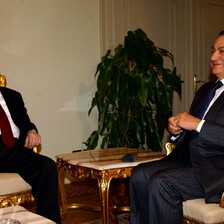The Electronic Intifada 13 January 2009
CAIRO (IPS) - A week after the unveiling of a Franco-Egyptian ceasefire proposal aimed at stopping the bloodshed in the Gaza Strip, Palestinian resistance faction Hamas and on the face of it Israel, are still discussing the fine print of an agreement.
“Details of the proposal remain unclear,” Abdelaziz Shadi, coordinator of Cairo University’s Israeli studies program told IPS. “Both sides are still in the process of studying its terms to determine whose interests it serves.”
On 6 January, President Hosni Mubarak and his French counterpart Nicolas Sarkozy, in the region for a round of shuttle diplomacy, unveiled a three-point initiative. It calls for a temporary ceasefire by both sides to allow aid into the Gaza Strip; holding talks with Israeli and Palestinian representatives in order to “secure” the border area and reopen the Rafah border crossing between Egypt and the Gaza Strip; and the renewal of dialogue between rival Palestinian factions.
Hamas officials have given the initiative a cautious welcome, but insist that the agreement must unequivocally guarantee the reopening of the Gaza’s Strip’s borders, currently sealed by the Israeli and Egyptian authorities.
“Hamas will not accept the ceasefire proposal unless it results in the lifting of the ongoing Israeli siege of the Gaza Strip,” leading Hamas member Moussa Abu Marzouk said Friday, 9 January.
Ever since Hamas seized the Gaza Strip from the US-backed Palestinian Authority in the summer of 2007 (having won legislative elections a year earlier), the coastal territory has been subject to a crippling embargo that has brought it to humanitarian ruin. Backed by the US and EU, the de facto siege continues to deprive the strip’s 1.5 million inhabitants of desperately needed food, medicine and fuel.
For the last three days, Hamas officials have been meeting with Egyptian mediators in Cairo to discuss the proposal in detail.
On Monday, 12 December, the state press quoted an unnamed official as saying that talks were proceeding “positively.” Egypt and Hamas, he was quoted as saying, “shared unanimous views on the need to reach an immediate ceasefire to stem Palestinian bloodletting.”
On the same day, however, Salah al-Bardaweel, Hamas MP and member of the Hamas delegation in Cairo, was quoted as saying that the agreement’s main points were “still subject to debate.”
“We’ve told the Egyptians that we have some reservations about certain articles of the proposal, and these reservations are still under discussion,” al-Bardaweel said. “We’re not talking about them publicly, though, as we still hope to reach an agreement in keeping with Palestinian interests.”
Israeli spokesmen, meanwhile, welcomed the proposal, provided that it stipulates a halt to rockets fired from the Gaza Strip and to alleged weapons smuggling across Egypt’s border with Gaza. In the coming days, Israeli defense official Amos Gilad is expected to visit Cairo — his second trip in a week — to discuss the proposal with Egyptian officials.
Aymen Abdelaziz Salaama, professor of international law at Cairo University, doubts the proposal would yield significant gains for the Palestinian side.
“Firstly, the agreement — as it now stands — reflects the military situation on the ground, in which Palestinians are being killed in scores on a daily basis,” Salaama told IPS. “Secondly, the US and the EU both appear to sympathize with Israel’s position, and will unlikely put pressure on Israel to halt the aggression before it accomplishes its military goals.”
A recent UN Security Council (UNSC) resolution, meanwhile, has been no more effective in stopping Israel’s war on the Hamas-run enclave, now approaching the end of its third week.
Although the UNSC adopted a resolution on 8 January calling for an immediate ceasefire, Israel quickly declared its intention to continue military operations in the Gaza Strip. “The Israeli Defense Forces will continue acting in order to attain the goals of the operation,” Israeli officials declared in a statement last Friday.
“I’m not surprised. The UNSC resolution has no teeth,” complained Shadi. “It lays down no specific mechanisms for implementing a ceasefire, or states how exactly Israel should be pressured into abiding by its terms.”
According to Shadi, only Egypt — as one of the few states to have a working relationship with both Israel and Hamas — stands a chance of hammering out a mutually acceptable ceasefire agreement.
“Egypt has means of pressuring both sides,” he said. “As the biggest Arab country to have diplomatic relations with Israel, it can put pressure on Israel; meanwhile, it can use the Egypt-Gaza border as leverage with Hamas.”
Shadi went on to point to Egypt’s central role in brokering a six-month truce last summer between Israel and Palestinian resistance factions — chief among them Hamas — in the Gaza Strip. The expiration of that ceasefire agreement on 19 December directly preceded the launch of Israel’s current campaign against Gaza.
Notably, Egypt’s Muslim Brotherhood opposition movement — which is ideologically close to Hamas — has rejected the Franco-Egyptian initiative outright.
“The Muslim Brotherhood rejects the proposal because the only clear stipulation so far is for a temporary ceasefire and for both sides to show ‘restraint’ — as if the two sides were military equals,” Hamdi Hassan, prominent MP for the Muslim Brotherhood, Egypt’s largest opposition movement, told IPS. “And the rest of the articles, on the border and other issues, remain extremely ambiguous.”
“What’s more, the proposal completely ignores any reference to Israel’s continued commission of war crimes against Gaza’s civilian population,” Hassan added. “Not to mention its practice of targeting mosques and religious structures, or its frequent use of illegal weapons.”
All rights reserved, IPS - Inter Press Service (2009). Total or partial publication, retransmission or sale forbidden. Jim Lobe in Washington contributed to this article.
Related Links


